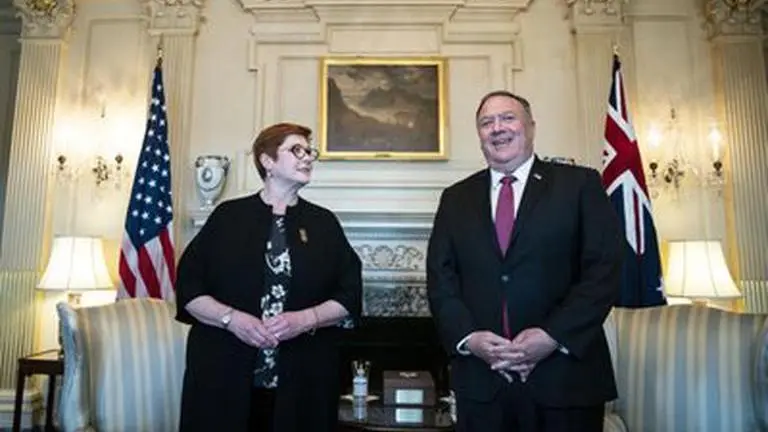Updated 29 July 2020 at 11:46 IST
US, Australia hold high level talks on China
Tensions between China and the Western democracies over China's crackdown in Hong Kong, COVID-19 and claims regarding the South China Sea dominated discussions between U.S. and Australian officials at the Australia-US Ministerial Consultations, known as AUSMIN.
- World News
- 2 min read

Tensions between China and the Western democracies over China's crackdown in Hong Kong, COVID-19 and claims regarding the South China Sea dominated discussions between U.S. and Australian officials at the Australia-US Ministerial Consultations, known as AUSMIN.
Despite the coronavirus pandemic Australia's top diplomat and defence chief travelled to Washington, D.C. to meet with Secretary of State Mike Pompeo and Defense Secretary Mark Esper.
"The United States commends the Morrison government for standing up for democratic values and the rule of law, despite intense continued coercive pressure from the Chinese Communist Party to bowed to Beijing's wishes," said Pompeo at a joint press conference following the discussions.
"We reiterated our commitment to holding states to account when they breach international norms and laws, as we have done, and will continue to do so in relation to China's erosion of freedoms in Hong Kong," said Australian Foreign Minister Marise Payne.
Advertisement
As China has grown into the world's second-largest economy, behind only the U.S., it is increasingly viewed as a competitor, both economically and militarily, and a potential challenger to the Western-led democratic model that has dominated the post-World War II era.
Election-year politics in the U.S. are fanning the flames, as President Donald Trump appears to be using friction with China to drum up support among his base. Whether or not he is reelected in November, underlying differences will remain.
Advertisement
Militarily, American and Chinese warships often jockey for position in the South China Sea. Economically, the U.S. is leaning on its allies to exclude Chinese telecom leader Huawei from their mobile networks, raising the specter of cybersecurity. On human rights, the U.S. is imposing sanctions over Chinese policies in Hong Kong, Tibet and Xinjiang.
"Secretary Esper and I signed a statement of principles on alliance defense cooperation and on force posture priorities in the Indo-Pacific," said Australian defense chief Linda Reynolds.
"This builds on our successful force posture cooperation over the past 10 years and it will drive the next decade of our defense cooperation in the Indo-Pacific," she said.
"We will stand firm in upholding the international rules-based order. And we applaud Australia for pushing back against the CCP (Chinese Communist Party) as brazen economic threats and coercive behavior and increasing risk of retaliation," Esper said.
Published By : Associated Press Television News
Published On: 29 July 2020 at 11:46 IST
